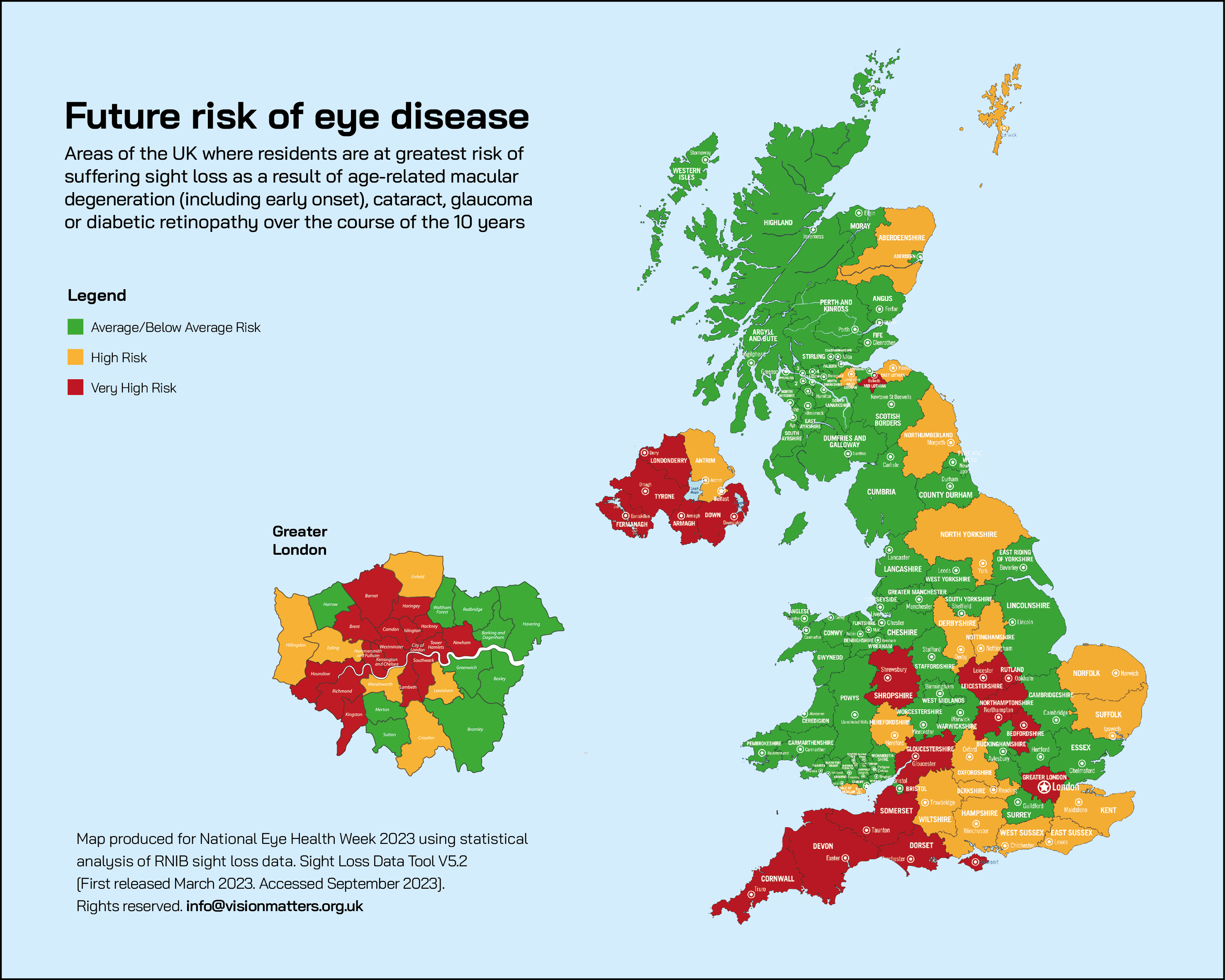Last Updated on: 22nd November 2023, 02:38 pm
As part of National Eye Health Week (18-24 September), a national campaign is being launched to encourage people to resume regular eye tests. The campaign follows data revealing that 4.7 million NHS sight tests have been missed since the pandemic disrupted healthcare routines [1], with one in five individuals postponing or canceling a sight test in the past year due to cost concerns [2].
The campaign aims to address this issue as health analysts predict that a million more Britons will experience one of the four main causes of blindness in the next decade. Late-stage age-related macular degeneration (AMD), the UK’s leading cause of sight loss, is expected to increase by 25% by 2032. Early-stage AMD (drusen) is predicted to rise by 16%, cataract by 25%, glaucoma by 17%, and the incidence of diabetic retinopathy by 5% [3].
Highlighted areas of the UK at increased risk of future eye disease include North-East Derbyshire, the London Borough of Tower Hamlets, Milton Keynes, and Mid-Ulster.
David Cartwright, Chair of Eye Health UK, emphasises the importance of prevention, early diagnosis, and treatment in reducing unnecessary sight loss. He states that half of sight loss can be prevented by regular eye checks, adopting a healthy lifestyle, not smoking, and protecting eyes from sun exposure.
Regular eye tests are crucial health checks, as damage can occur before individuals notice it, and optometrists can detect microscopic changes inside the eye. Changes within the eye can lead to various eye conditions and indicate underlying health issues such as high blood pressure, raised cholesterol, and the risk of stroke and heart disease.
Health Minister Neil O’Brien emphasises that regular sight tests are essential for everyone, and free NHS testing is available for various groups, including children, people over 60, and those on income-related benefits.
Renowned broadcaster, model, author, and activist Katie Piper OBE stresses the importance of routine eye health checks based on her personal experience [4].
Lifestyle habits also have a significant impact on eye health regardless of your genetic predisposition[5]. Some of the ways your lifestyle could put you at increased risk of avoidable sight loss include:
The National Eye Health Week website (visionmatters.org.uk) offers an online eye health calculator to determine an individual’s risk of future sight loss.
[1]Calculated using NHS GOS Statistics for England, Wales, Scotland and Northern Ireland. Comparison of sight test volumes for the period Apr 2017 – March 2020 Vs Apr 2020 – March 2023. England Total 39,613,397 Vs 36,442,138. Wales Total 2,399,250 Vs 1,895,265. Scotland 4,526,138 (2018/2020) Vs 3,689,792 (2020/2022). Northern Ireland 1,403,708 Vs 1,193,732. Total Variation 4,721,566. England down 3,171,259, Wales down 503,985, Scotland down 836,346; NI down 209,976 compared to pre pandemic period.
[2]Survey of 2,003 UK Adults commissioned by College Optometrists, May 2023.
[3] Calculated using RNIB, Sight Loss Data Tool V.5.2 accessed September 2023. Figures include patients in early stages of eye disease who might not have recognised symptoms.
[4] From an exclusive interview Katie has given to Vista, the official National Eye Health Week magazine. Cover image attached.
[5]Kristin J. Myers et al. Ophthalmology Journal Vol 122







